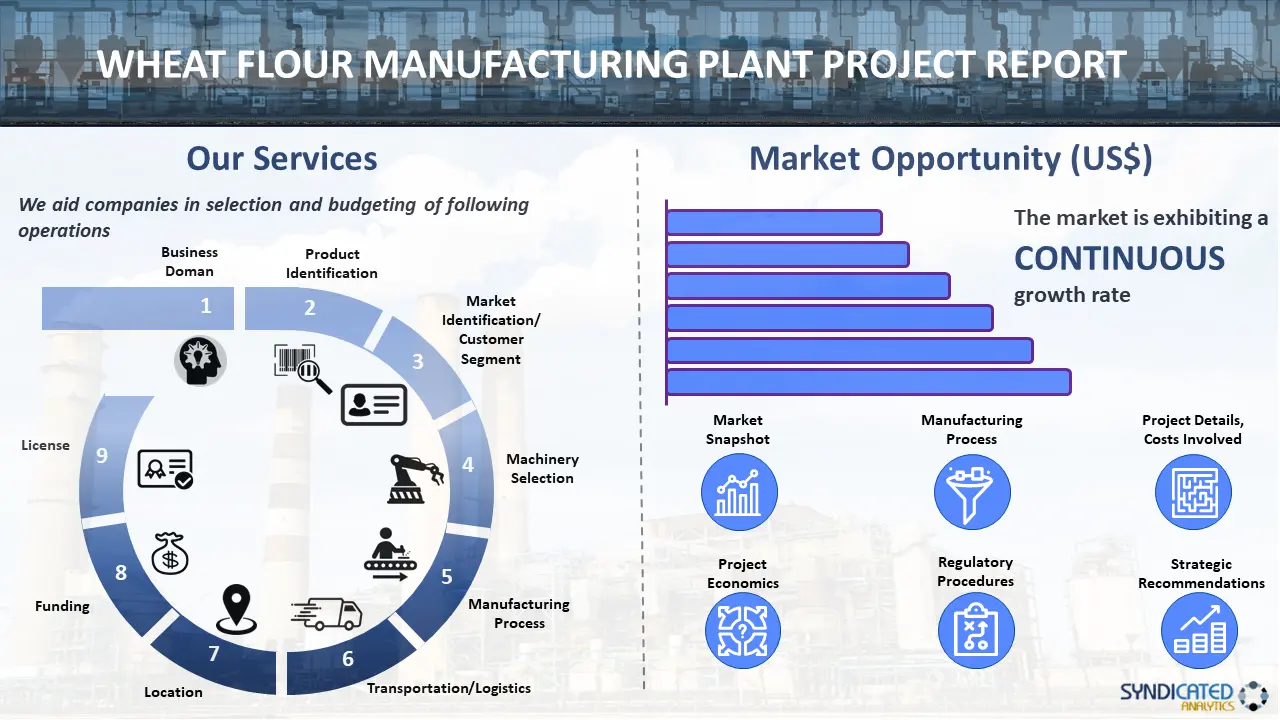
Wheat Flour Manufacturing Plant Project Report 2025 Edition
Report Coverage: Industry Analysis (Market Performance, Segments, Price Analysis, Outlook), Detailed Process Flow (Product Overview, Unit Operations, Raw Materials, Quality Assurance), Requirements and Cost (Machinery, Raw Materials, Packaging, Transportation, Utility, Human Resource), Project Economics (Capital Investments, Operating Costs, Profit Projections, Financial Analysis, Revenue), and Investment Opportunities
Report Overview:
Syndicated Analytics report, titled “Wheat Flour Manufacturing Plant Project Report 2025 Edition: Industry Analysis (Market Performance, Segments, Price Analysis, Outlook), Detailed Process Flow (Product Overview, Unit Operations, Raw Materials, Quality Assurance), Requirements and Cost (Machinery, Raw Materials, Packaging, Transportation, Utility, Human Resource), Project Economics (Capital Investments, Operating Costs, Profit Projections, Financial Analysis, Revenue), and Investment Opportunities ,” provides a complete roadmap for setting up a wheat flour manufacturing plant. It covers a comprehensive market overview to micro-level information such as unit operations involved, raw material requirements, utility requirements, infrastructure requirements, machinery and technology requirements, manpower requirements, packaging requirements, transportation requirements, etc. The report provides detailed insights into project economics, including capital investments, project funding, operating expenses, income and expenditure projections, fixed costs vs. variable costs, direct and indirect costs, expected ROI and net present value (NPV), profit and loss account, financial analysis, etc. This report is a must-read for entrepreneurs, investors, researchers, consultants, and business strategists with a stake in the wheat flour industry. It provides an in-depth analysis of the industry's current state and future potential, offering valuable insights for decision-making and strategy development. The report is an indispensable resource that offers a detailed examination of the wheat flour industry. It is a valuable tool for anyone seeking to establish a foothold in this dynamic sector.

Wheat flour is a ubiquitous ingredient in numerous cuisines across the globe, tracing its origins back to ancient times when wheat was first cultivated. Derived from grinding whole or partial wheat grains, this finely textured powder boasts a range of uses that are both culinary and functional. Its consumption is widespread due to its availability, affordability, and the culinary characteristics it lends to various dishes such as providing structure to baked goods and thickness to sauces. Despite its seemingly simple nature, the spectrum of wheat flour is vast, ranging from white, whole wheat, to a variety of specialty flours, each differing in their nutrient content and culinary properties.
The health benefits of wheat flour are manifold, though they vary depending on the type of flour in question. Whole wheat flour, made from grinding the entire wheat kernel, is notably rich in dietary fiber. This fiber aids in maintaining healthy digestion, reducing the risk of heart disease, and managing weight. Additionally, whole wheat flour is high in essential nutrients such as B-vitamins, iron, folate, and magnesium. White flour, although often enriched with certain vitamins and minerals, lacks the fiber and nutrient richness of its whole wheat counterpart, but still offers valuable energy-providing carbohydrates. Furthermore, wheat flour, especially the whole grain version, is linked with reduced risk of chronic diseases such as type 2 diabetes and certain types of cancer, contributing to its reputation as a beneficial dietary component.
Market Trends/Drivers:
Several market dynamics are propelling the demand for wheat flour. Its versatility in a wide range of applications, from bread, cakes, and cookies to pasta and noodles, has been a major driver. Similarly, the rise of consumer consciousness about health and wellness has encouraged the consumption of whole wheat flour. The growth of the bakery industry, fueled by evolving dietary trends and a surge in the popularity of convenience food, also contributes to the upward trajectory of the wheat flour market. Additionally, the market is stimulated by innovations in food technology and new product formulations, expanding the role of wheat flour beyond traditional uses. For instance, the demand for specialty wheat flours, such as spelt and emmer, has risen as consumers explore varied tastes and textures in their food. Similarly, organic and non-GMO wheat flours have found favor among consumers concerned about sustainable and ethical food production. Despite facing competition from alternative flours in the era of diverse dietary preferences, wheat flour holds a firm position in the global food economy, buoyed by its long-established presence, nutritional benefits, and multifaceted utility.
The project report provides a comprehensive analysis of the wheat flour market, covering various critical aspects. The following sections are included:
Market Overview:
- Market Performance Analysis
- Regional Coverage
- Key Market Segmentation
- Price Trend Analysis
- COVID-19 Impact Analysis
- Market Forecast and Outlook
- Key Market Players
The report provides an analysis of the global wheat flour market performance, market breakup by segment and region, price trends, key market players and impact of COVID-19 on the market. Additionally, it offers insights into the market outlook, including growth opportunities and challenges that may impact the industry's future.
Manufacturing Operations:
- Product Description and Insights
- Detailed Process Flow Analysis
- Identification of Unit Operations Involved
- Mass Balance Analysis and Raw Material Requirements
- Quality Control
The report offers a detailed insight into the manufacturing process for wheat flour. It covers the product insights, the process flow, unit operations involved, quality control, as well as the mass balance and raw material requirements involved.
Project Requirements, Details, and Costs:
- Site Development, Location, and Land Requirements
- Plant Layout
- Machinery Requirements and Associated Costs
- Raw Material Requirements and Associated Costs
- Packaging Requirements and Associated Costs
- Transportation Requirements and Associated Costs
- Utility Requirements and Associated Costs
- Manpower Requirements and Associated Costs
This section covers the project details, requirements, and costs involved in setting up a wheat flour manufacturing plant. It provides information on land, location, and site development, plant layout, machinery requirements and expenditures, raw material and packaging requirements and expenditures, transportation requirements and expenditures, utility requirements and expenditures, as well as manpower requirements and expenditures.
Project Financial Analysis:
- Capital Investments Analysis
- Operating Costs Analysis
- Expenditure Projections Analysis
- Revenue Projections Analysis
- Taxation and Depreciation Analysis
- Profit Projections Analysis
- Comprehensive Financial Analysis
The report also covers a comprehensive analysis of the project economics for setting up a wheat flour manufacturing plant. This includes the analysis of capital expenditure (CapEx), operating expenditure (OpEx), income projections, taxation, depreciation, liquidity analysis, profitability analysis, payback period, NPV, uncertainty analysis, and sensitivity analysis.
Customized Solutions and Report Features:
The report can be customized based on your specific requirements. This may include information on the country/region you plan to set up your plant, manufacturing capacity, machinery suppliers and costs, and any additional scope requirements. Some of the customizations requested by our clients include:
- Customization based on the location of your plant
- Manufacturing capacity customization
- Machinery supplier and cost customization
- Additional scope based on your specific needs
The report offers valuable insights into the wheat flour market, covering critical aspects such as market performance, manufacturing processes, project details, project economics, and key success and risk factors. With its comprehensive analysis, it is an essential resource for entrepreneurs, investors, researchers, consultants, and business strategists interested in the industry.
Report Scope:
| Report Features | Details |
|---|---|
| Product Name | Wheat Flour |
| Report Coverage | Detailed Process Flow: Unit Operations Involved, Quality Assurance Criteria, Technical Tests, Mass Balance, and Raw Material Requirements Land, Location and Site Development: Selection Criteria and Significance, Location Analysis, Project Planning and Phasing of Development, Environmental Impact, Land Requirement and Costs Plant Layout: Importance and Essentials, Layout, Factors Influencing Layout Plant Machinery: Machinery Requirements, Machinery Costs, Machinery Suppliers (Provided on Request) Raw Materials: Raw Material Requirements, Raw Material Details and Procurement, Raw Material Costs, Raw Material Suppliers (Provided on Request) Packaging: Packaging Requirements, Packaging Material Details and Procurement, Packaging Costs, Packaging Material Suppliers (Provided on Request) Other Requirements and Costs: Transportation Requirements and Costs, Utility Requirements and Costs, Energy Requirements and Costs, Water Requirements and Costs, Human Resource Requirements and Costs Project Economics: Capital Costs, Techno-Economic Parameters, Income Projections, Expenditure Projections, Product Pricing and Margins, Taxation, Depreciation Financial Analysis: Liquidity Analysis, Profitability Analysis, Payback Period, Net Present Value, Internal Rate of Return, Profit and Loss Account, Uncertainty Analysis, Sensitivity Analysis, Economic Analysis Other Analysis Covered in The Report: Market Trends and Analysis, Market Segmentation, Market Breakup by Region, Price Trends, Competitive Landscape, Regulatory Landscape, Strategic Recommendations, Case Study of a Successful Venture |
| Currency | US$ (Information can also be provided in the local currency) |
| Pricing and Purchase Options | Single User License: US$ 3450 Five User License: US$ 4450 Corporate User License: US$ 5450 |
| Customization Scope | The report can also be customized based on the requirement of the customer |
| Post-Sale Analyst Support | 12-14 Weeks |
| Delivery Format | PDF and Excel through email (We can also provide the editable version of the report in PPT/Word format on special request) |
The report also answers several key questions for stakeholders who are planning to enter the wheat flour market. Some of these include:
- What are the major success and risk factors in the global wheat flour industry?
- How has the global wheat flour market performed thus far and what is its future outlook?
- What is the industry's structure and who are the key players?
- What unit operations are involved in a wheat flour manufacturing plant?
- How much land is required for a wheat flour manufacturing plant?
- What machinery is required for a wheat flour manufacturing plant?
- What are the raw materials needed for a wheat flour manufacturing plant?
- What utility requirements are there for a wheat flour manufacturing plant?
- What is the manpower requirement for a wheat flour manufacturing plant?
- What is the infrastructure cost for a wheat flour manufacturing plant?
- What are the capital costs for a wheat flour manufacturing plant?
- What are the operating costs for a wheat flour manufacturing plant?
- What is the pricing mechanism for wheat flour?
- What are the income and expenditure for a wheat flour manufacturing plant?
- How long does it take to break-even?
Why Our Reports Stand Out:
- Gain valuable insights into your business venture's potential, allowing you to make informed decisions.
- Access a global network of consultants and domain experts in 100+ countries across North America, Europe, Asia Pacific, South America, Africa, and the Middle East.
- Benefit from our extensive database of equipment and raw material suppliers from all major continents.
- Stay up-to-date with the latest global data on land costs, construction costs, utility costs, labor costs, and more in 100+ countries.
- Join a diverse range of satisfied clients, including Fortune 500 companies, governments, institutions, and small startups.
- Receive support from our expert in-house team of engineers, statisticians, modeling experts, chartered accountants, architects, and more, who have played a critical role in building, expanding, and optimizing sustainable manufacturing plants worldwide.
Purchase Options
Ask For Customization
Personalize this research
Triangulate with your own data
Get data as per your format and definition
Gain a deeper dive on a specific application, geography, customer or competitor
Any level of personalization
Get in Touch
Call us on
US: +1-213-316-7435
Uk: +44-20-8040-3201
Drop us an email at
sales@syndicatedanalytics.com